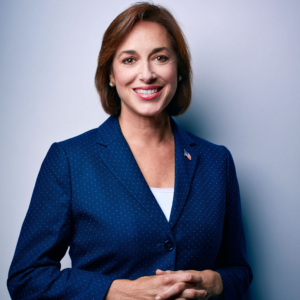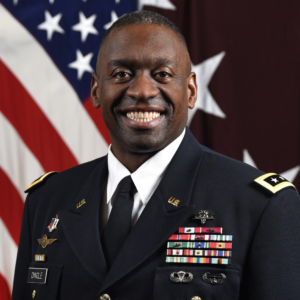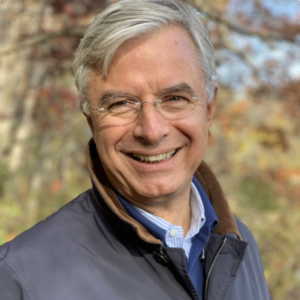December 23, 2021
Watch
Listen
Read

Dr. Karen DeSalvo is a physician executive working at the intersection of medicine, public health, and information technology whose career has focused on improving health and eliminating disparities. She leads a team of health professionals at Google who provide clinical guidance for the development of inclusive research, products and services.
Prior to joining Google, Dr. DeSalvo was National Coordinator for Health Information Technology and acted as the Assistant Secretary for Health in the Obama Administration. During her time at the U.S. Department of Health and Human Services, Dr. DeSalvo focused on creating a more consumer-oriented, transparent and value-based health system.
Dr. DeSalvo served as the New Orleans Health Commissioner following Hurricane Katrina. Prior to that she was Vice Dean for Community Affairs and Health Policy at the Tulane School of Medicine where she was a practicing internal medicine physician, educator, researcher and leader. She serves on the Council of the National Academy of Medicine.

Lieutenant General R. Scott Dingle is the 45th Surgeon General of the U.S. Army and Commanding General, U.S. Army Medical Command. Prior to his appointment, he served as the Deputy Surgeon General and Deputy Commanding General (Support), U.S. Army Medical Command.
His previous military assignments include: Commanding General, Regional Health Command – Atlantic; Deputy Chief of Staff, G-3/5/7, Office of The Surgeon General, Falls Church, Virginia; Commander, 30th Medical Brigade, Germany; Director, Health Care Operations/G-3, Office of The Surgeon General, Falls Church, Virginia; Commander, U.S. Army Medical Recruiting Brigade, Fort Knox, Kentucky; Commander, 261st Multifunctional Medical Battalion, Fort Bragg, North Carolina; Chief, Current Operations, Special Plans Officer, Healthcare Operations Executive Officer, Office of The Surgeon General, Falls Church, Virginia; Chief, Medical Plans and Operations Multinational Corps-Iraq Surgeon’s Office, OPERATION IRAQI FREEDOM, Baghdad, Iraq; Chief, Medical Plans and Operations, 18th Airborne Corps Surgeon’s Office, Fort Bragg, North Carolina; Executive Officer, 261st Area Support Medical Battalion (44th MEDCOM), Fort Bragg, North Carolina; Ground Combat Planner for Combined Joint Task Force -180, OPERATION IRAQI FREEDOM, Baghdad, Iraq; Assistant Chief of Staff, Plans and Exercises, 44th Medical Command and 18th Airborne Corps Plans Officer, Fort Bragg, North Carolina; Chief, Division Medical Operations Center, 1st Armored Division, Germany; Instructor, Officer Basic and Advanced Courses, Army Medical Department Center and School, Fort Sam Houston, Texas; Plans Officer, 3rd Infantry Division Medical Operations Center, Germany; Commander, Charlie Company, 3rd Forward Support Battalion, Germany; Commander, Medical Company and Medical Hold Detachment, Fort Eustis, Virginia; Chief of Plans, Operations, Training, and Security, Fort Eustis, Virginia; Adjutant, Fort Eustis, Virginia; Ambulance Platoon leader and Motor Officer, 75th Forward Support Battalion, 194th Separate Armored Brigade; Fort Knox, Kentucky.
Dingle is a Distinguished Military Graduate of Morgan State University. His degrees include Master of Science in Administration from Central Michigan University, Master of Military Arts and Science from the School of Advanced Military Studies and a Master of Science in National Security Strategy from the National War College.
His awards and decorations include the Distinguished Service Medal (Oak Leaf Cluster), Legion of Merit (two Oak Leaf Clusters), Bronze Star Medal, Meritorious Service Medal (seven Oak Leaf Clusters), Joint Service Commendation Medal, Joint Meritorious Unit Award, Army Commendation Medal (two Bronze Oak Leaf Clusters), Army Achievement Medal (one Bronze Oak Leaf Cluster), Humanitarian Service Medal, the Order of Military Medical Merit, Recruiters Medallion, the Order of Kentucky Colonels, the Army Surgeon General’s prestigious 9A Proficiency Designator, Expert Field Medical Badge, Parachutist Badge, and the Air Assault Badge.

Hubert Joly is a senior lecturer at the Harvard Business School and the former Chairman and Chief Executive Officer of Best Buy.
He is also a member of the board of directors of Johnson & Johnson and Ralph Lauren Corporation, a member of the International Advisory Board of HEC Paris, and a Trustee of the Minneapolis Institute of Art and of the New York Public Library.
Joly has been recognized as one of the top 100 CEOs in the world by the Harvard Business Review, one of the top 30 CEOs in the world by Barron’s and one of the top 10 CEOs in the U.S. by Glassdoor.
He is the author of the best-selling book “The Heart of Business – Leadership Principles for the Next Era of Capitalism.”
Gary Bisbee, Ph.D. 0:48
On The Gary Bisbee Show, our conversations explore the professional and personal decisions healthcare leaders make. As this show developed, we found that a number of our audience members were young up-and-comers. We decided to start asking healthcare leaders if they have any professional or personal advice specifically for you, an emerging leader.
For this episode, we compiled some of those answers from three healthcare leaders.
We will hear from Karen DeSalvo, M.D., the Chief Health Officer at Google. Next, we will listen to Lieutenant General Scott Dingle. He is the Surgeon General of the U.S. Army and Commanding General of the U.S. Army Medical Command. To wrap up, we will turn to Hubert Joly. He is a Senior Lecturer at the Harvard Business School and the former chairman and CEO of Best Buy.
To begin, let’s turn to Dr. Karen DeSalvo, to hear her advice for up-and-coming leaders.
Karen DeSalvo, M.D. 1:45
You know, I always tell people to pace themselves, which, Gary, is not my best quality. As much as John Peabody taught me to say no, and I’ve gotten better with each year. I also am a very passionate person, and I get excited, and like many folks, I want to take things on. And I want to do a lot of good in the world. And that sounds so silly when I say it aloud, but it matters to me. And it’s hard when you have that kind of a passionate drive to not only say no, but to know that you don’t have to solve everything right away. So I want them to realize that the journey is so important. The people that you’ll get to know on the journey will make you better, smarter, it’ll enrich your life and that you have to take time to build those relationships and experiences to hone your skills. Because you never know when that big thing is going to come. But if you’re racing towards solving that one goal and not really thinking about other opportunities, or not really giving yourself the downtime to reflect, and make sure that you’re making yourself better for the next turn of the crank, I think you don’t do yourself or others a service.
Gary Bisbee, Ph.D. 2:54
Karen encourages new leaders to be passionate, but don’t be blinded by it. For both your career and life, it is important to enjoy and reflect on the journey.
Next is Lieutenant General Scott Dingle, and his advice for young leaders.
Lt. Gen. R. Scott Dingle 3:11
I would tell them to live their dream and pursue their passion in the healthcare profession. Don’t let anyone discourage you. Don’t let anyone tell you no. Don’t let the struggles of academia or professional hurdles stop you from living your dream in the healthcare profession because your passion to preserve and impact the lives of others who do health care is what’s going to make you successful. I would tell you to be the best, be excellent. There’s no room for error when healthcare because it’s precise. We need you to be precise. If you’re precise, if you’re passionate, you’re persistent, and you’re perfect at what you do, there is nothing that can stop you from living your dream of being the best cardiologist, the best doctor, the best nurse, the best administrator, the best veterinarian, or physician assistant, or whatever it may be. Go after your passion. And when you go after your passion in the healthcare industry, you can always have the gratification of, again, impacting the lives of people. That’s what we do in the healthcare industry. But you will also be living your joy. And now your joy will never be a job nine to five because you love what you do. But you also got to be careful as Gary mentioned earlier, you got to keep the balance too. Because often in the healthcare industry, we love what we do with passion. I don’t know if you all can tell, but I’m very passionate about military medicine, and I love what I do. But yet I also get tired. And I have to have that balance so I can continue to lead and take care of others.
Gary Bisbee, Ph.D. 4:52
General Dingle encourages leaders to find what they love, and love what they do. However, don’t let your passion burn you out. Take time for yourself when you need it.
To wrap up, let’s hear from Hubert Joly.
Hubert Joly 5:08
Remember when we were flying, right, in the old days. The stewardess would tell us, “look, if the oxygen mask comes down, put it on yourself first before you help others.” And I think in this crazy environment, our resilience as leaders is challenged. And so you need to make sure that you take care of yourself, so that you can be a great leader. What does that mean concretely? I think that’s gonna mean, you know, probably exercise, breathe. But also, reflection and meditation. And a key question, and I’ll leave with this, is, how do you want to be remembered? One of the exercises we do in the new CEO program at Harvard is we ask the new CEOs to write their retirement speech. And my wonderful wife, Hortense, who is an executive leadership coach, she asked our client, I think it’s even better, to write down their eulogy. You know, the thing that people will say on the day you’re not here to listen anymore. And I think if you write this down, and regularly revisit it as your North Star, and by the way, being kind to yourself because you’re only human, right? So you’re not going to be perfect every day. Right? So, rather ask yourself every day, you know, did I do my best to try and be the leader I want to be? And if the answer is “no”, that’s okay. Don’t be harsh on yourself. There’s always tomorrow. So try again tomorrow and ask for help. Call Gary. You say, “Gary, do you have any advice for me on how I can become a better leader?”
Gary Bisbee, Ph.D. 6:47
It may seem dark to write your own eulogy. However, your career progression and life should reflect what you value most.
These mentors had slightly different advice, but all emphasized that it is important for young leaders to take care of themselves. It is valuable to rest, step back, and reflect.
Being a good leader when you’re young can seem like a daunting task. However, leadership is not a destination, rather a journey. It develops over time and we refine our skills with each new experience. Leadership is the accumulation of our abilities, experience, relationships, and reflections. So the advice we heard today is valuable for new leaders, as well as more experienced ones.
To learn more about leadership, and to grow your own leadership skills, we hope that you’ll follow our journey on The Gary Bisbee Show. Episodes drop every Thursday.